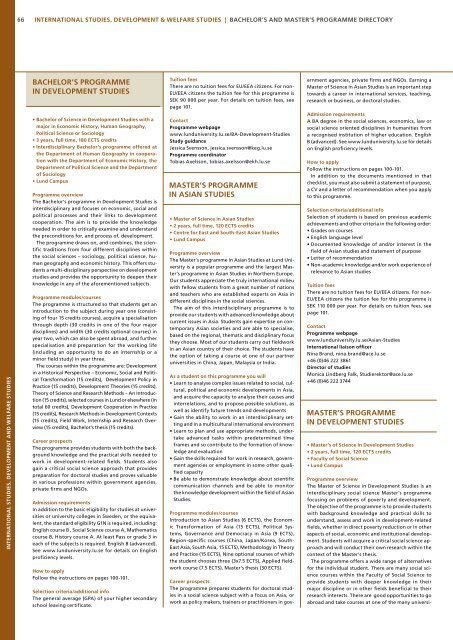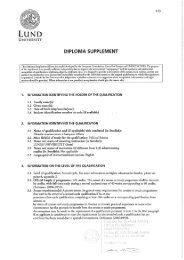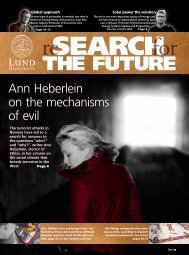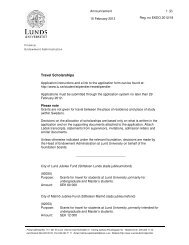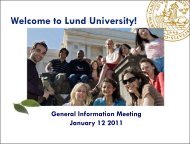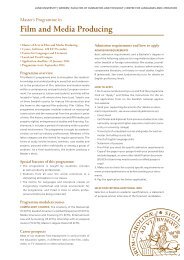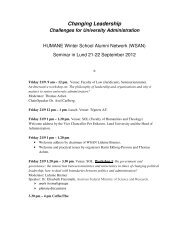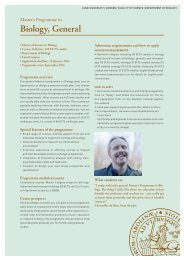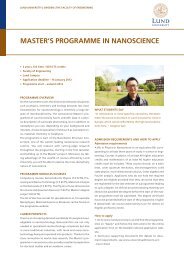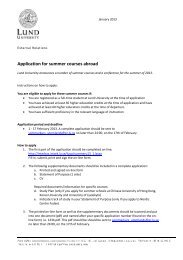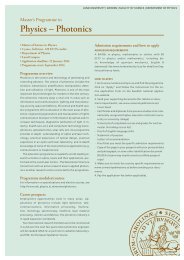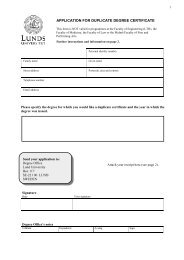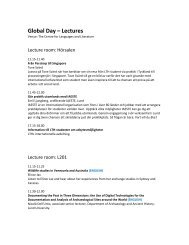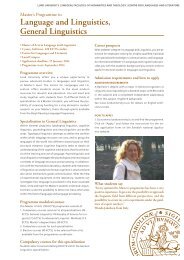Download our 2014/15 international student ... - Lund University
Download our 2014/15 international student ... - Lund University
Download our 2014/15 international student ... - Lund University
Create successful ePaper yourself
Turn your PDF publications into a flip-book with our unique Google optimized e-Paper software.
66 International Studies, Development & Welfare Studies | Bachelor’s and Master’s programme directoryInternational Studies, Development and Welfare StudiesBachelor’s Programmein Development Studies• Bachelor of Science in Development Studies with amajor in Economic History, Human Geography,Political Science or Sociology• 3 years, full time, 180 ECTS credits• Interdisciplinary Bachelor’s programme offered atthe Department of Human Geography in cooperationwith the Department of Economic History, theDepartment of Political Science and the Departmentof Sociology• <strong>Lund</strong> CampusProgramme overviewThe Bachelor’s programme in Development Studies isinterdisciplinary and focuses on economic, social andpolitical processes and their links to developmentcooperation. The aim is to provide the knowledgeneeded in order to critically examine and understandthe preconditions for, and process of, development.The programme draws on, and combines, the scientifictraditions from f<strong>our</strong> different disciplines withinthe social sciences – sociology, political science, humangeography and economic history. This offers <strong>student</strong>sa multi-disciplinary perspective on developmentstudies and provides the opportunity to deepen theirknowledge in any of the aforementioned subjects.Programme modules/c<strong>our</strong>sesThe programme is structured so that <strong>student</strong>s get anintroduction to the subject during year one (consistingof f<strong>our</strong> <strong>15</strong> credits c<strong>our</strong>ses), acquire a specialisationthrough depth (30 credits in one of the f<strong>our</strong> majordisciplines) and width (30 credits optional c<strong>our</strong>ses) inyear two, which can also be spent abroad, and furtherspecialisation and preparation for the working life(including an opportunity to do an internship or aminor field study) in year three.The c<strong>our</strong>ses within the programme are: Developmentin a Historical Perspective – Economic, Social and PoliticalTransformation (<strong>15</strong> credits), Development Policy inPractice (<strong>15</strong> credits), Development Theories (<strong>15</strong> credits),Theory of Science and Research Methods – An Introduction(<strong>15</strong> credits), selected c<strong>our</strong>ses in <strong>Lund</strong> or elsewhere (intotal 60 credits), Development Cooperation in Practice(<strong>15</strong> credits), Research Methods in Development Contexts(<strong>15</strong> credits), Field Work, Internship and Research Overview(<strong>15</strong> credits), Bachelor’s thesis (<strong>15</strong> credits).Career prospectsThe programme provides <strong>student</strong>s with both the backgroundknowledge and the practical skills needed towork in development-related fields. Students alsogain a critical social science approach that providespreparation for doctoral studies and proves valuablein various professions within government agencies,private firms and NGOs.Admission requirementsIn addition to the basic eligibility for studies at universitiesor university colleges in Sweden, or the equivalent,the standard eligibility G1N is required, including:English c<strong>our</strong>se B , Social Science c<strong>our</strong>se A, Mathematicsc<strong>our</strong>se B, History c<strong>our</strong>se A. At least Pass or grade 3 ineach of the subjects is required. English B (advanced).See www.lunduniversity.lu.se for details on Englishproficiency levels.How to applyFollow the instructions on pages 100-101.Selection criteria/additional infoThe general average (GPA) of y<strong>our</strong> higher secondaryschool leaving certificate.Tuition feesThere are no tuition fees for EU/EEA citizens. For non-EU/EEA citizens the tuition fee for this programme isSEK 90 000 per year. For details on tuition fees, seepage 101.ContactProgramme webpagewww.lunduniversity.lu.se/BA-Development-StudiesStudy guidanceJessica Svensson, jessica.svensson@keg.lu.seProgramme coordinatorTobias Axelsson, tobias.axelsson@ekh.lu.seMaster’s Programmein Asian Studies• Master of Science in Asian Studies• 2 years, full time, 120 ECTS credits• Centre for East and South-East Asian Studies• <strong>Lund</strong> CampusProgramme overviewThe Master’s programme in Asian Studies at <strong>Lund</strong> <strong>University</strong>is a popular programme and the largest Master’sprogramme in Asian Studies in Northern Europe.Our <strong>student</strong>s appreciate the truly <strong>international</strong> milieuwith fellow <strong>student</strong>s from a great number of nationsand teachers who are established experts on Asia indifferent disciplines in the social sciences.The aim of this interdisciplinary programme is toprovide <strong>our</strong> <strong>student</strong>s with advanced knowledge aboutcurrent issues in Asia. Students gain expertise on contemporaryAsian societies and are able to specialise,based on the regional, thematic and disciplinary focusthey choose. Most of <strong>our</strong> <strong>student</strong>s carry out fieldworkin an Asian country of their choice. The <strong>student</strong>s havethe option of taking a c<strong>our</strong>se at one of <strong>our</strong> partneruniversities in China, Japan, Malaysia or India.As a <strong>student</strong> on this programme you will• Learn to analyse complex issues related to social, cultural,political and economic developments in Asia,and acquire the capacity to analyse their causes andinterrelations, and to propose possible solutions, aswell as identify future trends and developments• Gain the ability to work in an interdisciplinary settingand in a multicultural <strong>international</strong> environment• Learn to plan and use appropriate methods, undertakeadvanced tasks within predetermined timeframes and so contribute to the formation of knowledgeand evaluation• Gain the skills required for work in research, governmentagencies or employment in some other qualifiedcapacity• Be able to demonstrate knowledge about scientificcommunication channels and be able to monitorthe knowledge development within the field of AsianStudies.Programme modules/c<strong>our</strong>sesIntroduction to Asian Studies (6 ECTS), the EconomicTransformation of Asia (<strong>15</strong> ECTS), Political Systems,Governance and Democracy in Asia (9 ECTS),Region-specific c<strong>our</strong>ses (China, Japan/Korea, South-East Asia, South Asia, <strong>15</strong> ECTS), Methodology in Theoryand Practice (<strong>15</strong> ECTS), Nine optional c<strong>our</strong>ses of whichthe <strong>student</strong> chooses three (3x7.5 ECTS), Applied fieldworkc<strong>our</strong>se (7.5 ECTS), Master’s thesis (30 ECTS).Career prospectsThe programme prepares <strong>student</strong>s for doctoral studiesin a social science subject with a focus on Asia, orwork as policy makers, trainers or practitioners in governmentagencies, private firms and NGOs. Earning aMaster of Science in Asian Studies is an important steptowards a career in <strong>international</strong> services, teaching,research or business, or doctoral studies.Admission requirementsA BA degree in the social sciences, economics, law orsocial science oriented disciplines in humanities froma recognised institution of higher education. EnglishB (advanced). See www.lunduniversity.lu.se for detailson English proficiency levels.How to applyFollow the instructions on pages 100-101.In addition to the documents mentioned in thatchecklist, you must also submit a statement of purpose,a CV and a letter of recommendation when you applyto this programme.Selection criteria/additional infoSelection of <strong>student</strong>s is based on previous academicachievements and other criteria in the following order:• Grades on c<strong>our</strong>ses• English language level• Documented knowledge of and/or interest in thefield of Asian studies and statement of purpose• Letter of recommendation• Non-academic knowledge and/or work experience ofrelevance to Asian studiesTuition feesThere are no tuition fees for EU/EEA citizens. For non-EU/EEA citizens the tuition fee for this programme isSEK 110 000 per year. For details on tuition fees, seepage 101.ContactProgramme webpagewww.lunduniversity.lu.se/Asian-StudiesInternational liaison officerNina Brand, nina.brand@ace.lu.se+46 (0)46 222 3861Director of studiesMonica Lindberg Falk, Studierektor@ace.lu.se+46 (0)46 222 3744Master’s Programmein Development Studies• Master’s of Science in Development Studies• 2 years, full time, 120 ECTS credits• Faculty of Social Science• <strong>Lund</strong> CampusProgramme overviewThe Master of Science in Development Studies is aninterdisciplinary social science Master’s programmefocusing on problems of poverty and development.The objective of the programme is to provide <strong>student</strong>swith background knowledge and practical skills tounderstand, assess and work in development-relatedfields, whether in direct poverty reduction or in otheraspects of social, economic and institutional development.Students will acquire a critical social science approachand will conduct their own research within thecontext of the Master’s thesis.The programme offers a wide range of alternativesfor the individual <strong>student</strong>. There are many social sciencec<strong>our</strong>ses within the Faculty of Social Science toprovide <strong>student</strong>s with deeper knowledge in theirmajor discipline or in other fields beneficial to theirresearch interests. There are good opportunities to goabroad and take c<strong>our</strong>ses at one of the many universi-


